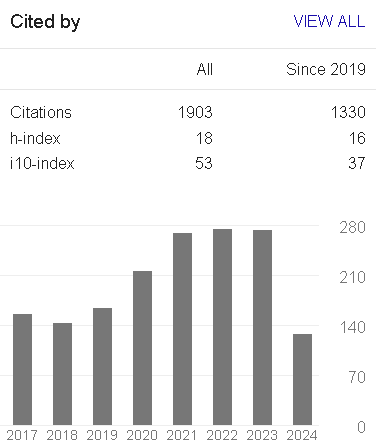A Study of Statistical Properties & Model Validation for Exponential Extension Model
Keywords:
Exponential Extension model, probability density function (pdf'), cumulative distribution function ( cdf), model validation, quantile-quantile(Q-Q) test, goodness of fit testAbstract
In this paper, we study the statistical properties of Exponential Extension Model and then we also check the validity of proposed model for different real data sets through different techniques. We are using two main techniques which are easy to understand and implement, and are based on intuitive and graphical techniques such as Q-Q-plot test, Kolmogorov–Smirnov (K-S) test which plot the graph of empirical distribution function and fitted distribution function. These plots are used to investigate whether an assumed model adequately fits a set of data and we present power comparison between p-values of these data sets obtaining by K-S test for model validation to obtain feasible real data sets which are most suitable for parameter estimation of exponential extension model.
References
Murthy, D.N.P., Xie, M. and Jiang, R. (2003). Weibull Models, Wiley, New York.
Haghighi, F. and Sadeghi, S., (2009) ‘ An Exponential Extension’, URL: http://hal.inria.fr/docs/00/38/67/55/PDF/p186.pdf
NADARAJAH, S., and Haghighi, F. (2009): An extension of the exponential distribution, Statistics, doi: 10.1080/02331881003678678.
Gupta, R.D., Kundu, D., 2001. Exponentiated exponential family: an alternative to gamma and Weibull distributions. Biometrical Journal 43, 117-130.
Srivastava, A.K. and Kumar V.(2011). Analysis of Software Reliability Data using Exponential Power Model. International Journal of Advanced Computer Science and Applications, Vol. 2, No. 2, February 2011, 38-45.
Kumar, R., Srivastava, A.K. and Kumar, V. (2012). Analysis of Gumbel Model for Software Reliability Using Bayesian Paradigm, International Journal of Advanced Research in Artificial Intelligence, Vol. 1 (9), 39-45.
Kumar, V. (2010). Bayesian analysis of exponential extension model, J. Nat. Acad.Math., Vol. 24, 109-128.
Kumar, V. and Ligges, U. (2011). reliaR : A package for some probability distributions. http://cran.rproject. org/web/packages/reliaR/index.html.
Lawless, J. F., (2003). Statistical Models and Methods for Lifetime Data, 2nd ed., John Wiley and Sons, New York.
Aarset, M. V. (1987). How to identify bathtub hazard rate. IEEE Transactions Reliability, 36,106-108.
Chhikara, R. S. & Folks, J. L. (1977). The inverse Gaussian distribution as a lifetime model. Technometrics, 19, 461–468.
J. I. McCool, ”Inferential Techniques for Weibull Populations”, Aeropace Research Laboratories Report ARL TR74-0180, Wright- atterson Air Force Base, Dayton, Ohio, 1974.
Ihaka, R. and Gentleman, R.R. (1996). R: A language for data analysis and graphics, Journal of Computational and Graphical Statistics, 5, 299–314.
Venables, W. N., Smith, D. M. and R Development Core Team (2010). An Introduction to R, R Foundation for Statistical Computing, Vienna, Austria. ISBN 3-900051-12-7, http://www.r-project.org.
Srivastava, A.K. and Kumar V. (2011). Markov Chain Monte Carlo methods for Bayesian inference of the Chen model, International Journal of Computer Information Systems, Vol. 2 (2), 07-14.
Eastman, J. and Bain, L.J., (1973).A property of maximum likelihood estimators in the presence of location-scale nuisance parameters, Communications in Statistics, 2, 23-28.
Srivastava, A.K. and Kumar V. (2011). Software reliability data analysis with Marshall-Olkin Extended Weibull model using MCMC method for non-informativeset of priors, International Journal of Computer Applications, Vol. 18(4), 31-39.
Hazewinkel, Michiel, ed. (2001), "Kolmogorov-Smirnov test",En cyclopedia of Mathematics, Springer, ISBN 978-1-55608- 010-4
Evans, M., Hastings, N., and Peacock, B.(2000). Statistical Distributions, 3rd ed. New York, Wiley.
Thode, H. C. (2002). Testing For Normality. CRC Press, ISBN: 0-8247-9613-6.
Downloads
Published
How to Cite
Issue
Section
License
Copyright (c) 2012 COMPUSOFT: An International Journal of Advanced Computer Technology

This work is licensed under a Creative Commons Attribution 4.0 International License.
©2023. COMPUSOFT: AN INTERNATIONAL OF ADVANCED COMPUTER TECHNOLOGY by COMPUSOFT PUBLICATION is licensed under a Creative Commons Attribution 4.0 International License. Based on a work at COMPUSOFT: AN INTERNATIONAL OF ADVANCED COMPUTER TECHNOLOGY. Permissions beyond the scope of this license may be available at Creative Commons Attribution 4.0 International Public License.


